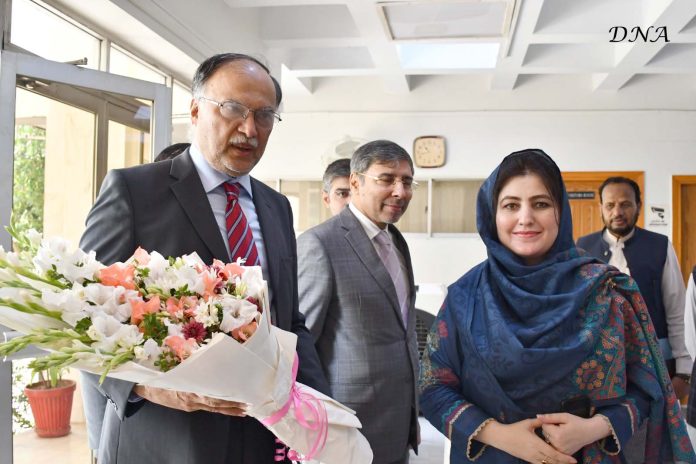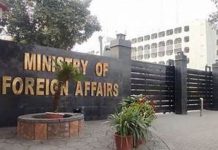Federal Minister Ahsan Iqbal emphasized that CPEC has been a transformative force for Pakistan’s economy, shifting it from the brink of collapse to an attractive investment destination
Mahnoor Ansar
Islamabad: A high-profile seminar was organized by the Institute of Regional Studies (IRS) on China Pakistan Economic Corridor (CPEC) and emerging opportunities under the title, “CPEC 2.0: Prospects and Challenges”. Federal Minister for Planning, Development and Special Initiatives, Ahsan Iqbal Chaudhary was the Chief Guest on the occasion while Senator Mushahid Hussain Syed along with Minister of Chinese Embassy in Pakistan, Yang Nuo, eminent economist Dr. Ashfaque Hasan Khan and other distinguished experts comprised the panel at the discussion attended by diplomats, academicians, intelligentsia and researchers.
In his keynote address on CPEC Phase 2.0, Federal Minister Ahsan Iqbal emphasized that CPEC has been a transformative force for Pakistan’s economy, shifting it from the brink of collapse to an attractive investment destination. He highlighted the strong bond of trust and shared vision between China and Pakistan, which has enabled them to overcome initial challenges. Now, as they enter the second phase of CPEC, the focus will be on industrial collaboration, regional connectivity, and socioeconomic development
The minister also asserted that for CPEC to be successful, it is crucial to establish peace, political stability and continuity of policies while demonstrating a continuous commitment to reforms. CPEC 2.0 aims to enhance technologies, create job opportunities, and ensure food security through agricultural mechanization. As we embark on this journey, it represents a critical opportunity for Pakistan to build a brighter future for generations to come. We must unite as one nation and one team to ensure the success of CPEC 2.0.
Earlier, in his welcoming remarks, Ambassador Jauhar Saleem, President of the IRS, stated that the all-weather strategic cooperative partnership between Pakistan and China had reached new heights with the launch of CPEC 2.0, which focuses on high-quality development, technological innovation, and sustainable growth. The upgraded vision prioritizes clean energy, IT, and agriculture amongst other things aligning with Pakistan’s 2025 goals and China’s 5Cs framework. CPEC 2.0 offers great opportunities for job creation, youth empowerment, and economic growth, provided security and institutional challenges are addressed to ensure productive investments.
Mr. Yang Nuo, Minister Counsellor of the Embassy of the People’s Republic of China, delivered special remarks on CPEC. He stated that the second phase of CPEC is poised to generate new momentum for Pakistan’s development, building on the project’s success over the past 11 years, which has attracted $25 billion in investments and transformed the country’s economic and social landscape. Chinese President Xi Jinping and Pakistani leaders have reached a consensus on advancing integration and enhancing Pakistan’s economic and social development through the second phase of CPEC. The joint efforts will focus on developing Special Economic Zones (SEZs), accelerating project implementation, and increasing Pakistan’s agricultural exports to China, thereby contributing to both China’s modernization and Pakistan’s growth.
Keynote speaker at the second session of the seminar Senator Mushahid Hussain Sayed, stated that the center of power is shifting from the West to the East. China is becoming a scientific super power, contributing 40 percent of research on AI and established top ranking universities. China’s diplomacy and role in the world has also broadened, he added. He noted that China viewed its relationship with Pakistan as a strategic long-term partnership based on mutual trust and cooperation. He also discussed attempts by hostile elements to sabotage CPEC through strategies aimed at demonizing, destabilizing, and damaging the initiative. Senator Mushahid further stressed that there is a broad national consensus on CPEC in Pakistan, demonstrated by all parties unity on June 21 during meeting with the visiting member of the Communist Party Central Committee Liu Jianchao which reaffirms strong support to CPEC.
Dr. Ashfaque Hassan Khan, Principal and Dean of Social Sciences and Humanities at NUST, emphasized that making CPEC a regional initiative involves more than just infrastructure development. He noted that CPEC is a comprehensive project aimed at promoting connectivity, regional cooperation, and integration. Its success is reflected in the participation of over 150 countries and 40 international institutions, underscoring its potential as a regional initiative. CPEC has the capacity to transform the regional economic landscape by connecting Central Asia, Afghanistan, Iran, and Oman. Additionally, Oman’s historical links with Gwadar make it a promising partner.
Professor Zhang Jiadong, an academic at Fudan University, said that Pakistan and China are good friends, and good friends help each other. He also emphasized the importance of dispelling propaganda regarding Chinese companies and focusing on frameworks to create more jobs and business opportunities. Additionally, he highlighted the need to avoid mistrust and address security issues.
Dr. Hasan Daud Butt, Former CEO of KPBOIT and Associate Professor at Bahria University, underscored the importance of transitioning from a G2G to a B2B model of development in CPEC Phase 2.0. He also emphasized that urban-rural synergy is crucial for the success of CPEC Phase 2.0, citing the example of the Haklai-DI Khan Road as an illustration of this synergy. Additionally, he highlighted the prospects for investments and addressed several concerns of investors regarding administrative hindrances in Pakistan.
Khalid Taimur Akram, Executive Director of the Pakistan Research Center for a Community with a Shared Future, discussed the prospects and opportunities arising from the integration of the 5Cs and 5Es frameworks. He also suggested that Pakistan should explore other regional corridors and their integration with CPEC to promote regional connectivity and leverage its role as a regional hub for trade and connections, aligning with the 5Es framework of development.
…
















